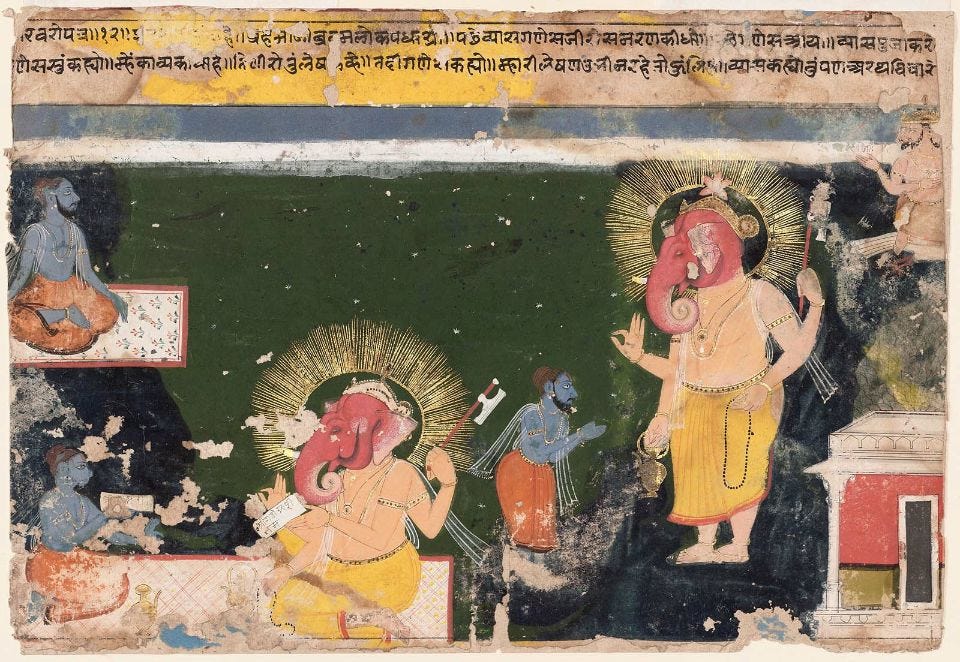Jayary Newsletter # 84

Repetition and Interjection
I have to admit that I struggle with the repetitions in the Jaya. Consider the story of Bhagiratha: the restorer of the ocean, the man who refills the ocean after Agastya digests it.
How do you think Bhagiratha is born? If you're puzzled, let ask you a follow on question: how do you think the Pandavas were born? How about the Kauravas? Let's not forget Draupadi's birth either. And while you are at it, check your diary to see if you took notes about Nala's conception, Lopamudra's birth and Damayanti's destiny. What's in common to their coming into being?
Every single one of them was born because:
Their parents were childless.
They desired children.
They prayed for children.
The supplicated god or rishi satisfied the would-be parent's desires.
In due course the mother gave birth to the hero or heroine in question.
At some point you have to ask: did they not know how to do it? Were the gods created by Prajapati in order to teach humans about the birds and the bees?
I know repetition has much greater standing in an oral culture than in a written one, but why? Maybe there's a simple explanation. The term "once upon a time" is like an interjection in myths and fairy tales, like saying "ah" or "accha." It's a way of keeping the story going, of signalling that I am shifting from one register to another.
If so, the "once upon a time there was a childless king and a queen" is an extended interjection, telling the listener that a hero(ine) is about to be born; a shorthand to invoke mental frames shared between the teller and the listener. We don't write novels like that anymore, but we are still in need of invoking shared culture. What frames do we use today?
Sagara
So how did Bhagiratha fulfil his dharma? It's a much longer story than I thought it would be.
Once upon a time, there was a king name Sagara. He, like many of the kingly race, had a problem conceiving children and so he and his wives prayed to Siva for children. Siva was pleased with the king's devotion and appeared in front of them; "ask me anything," said the blue throated god.
"We need children, my lord"
"Ah. I will bless you with two sets of children. One of your wives will have sixty thousand children who will all be wiped out. The other wife will have one son who will spread your glory." The god vanished before the king or his wives could ask questions about how sixty thousand babies could emerge out of one woman.
It turns out to be easy. The queen gave birth to a seething mass, but instead of throwing them into the trash, king Sagara carefully put in a gourd, where the mass differentiated itself into sixty thousand boys. How did he feed them? Did he hire sixty thousand wet nurses?
Unfortunately, the boys were real terrors, chasing and killing people and animals at random. They dug a hole all the way down the earth, killing daityas and nagas by the thousand.
Purana 2.0
Like every other occasion when they're dealt with a problem they can't solve, the gods go to Brahma and ask him to do something about the marauding sagarikas.
I don't get it: the gods are capable of fighting vritra one day and run away from a horde of human children the next day. At the same time, they are begging Prajapati to save the lives of nagas and daityas troubled by sagara's progeny. One day they're asking Agastya to drink down the ocean so they can chase down daityas; the next day the gods are beseeching the creator to strike down daitya killing sagarikas. How does that work? Consistency is not one of their virtues.
Brahma told them not to worry: they're going to meet their match soon. A rishi of course.
One day, Sagara organizes a horse sacrifice but the horse goes missing soon after the sacrifice begins. Sagara orders his children to look for the missing horse. They look all over and can't find it anywhere. Sagara asks them to look once more.
This time they are more successful; the spot the horse in Rishi Kasyapa's ashram. Unfortunately, their detective skills are their undoing, for Kaspaya is enraged by the commotion created by the searching sagarikas. One look from the rishi and the sixty thousand are burned to a crisp.
So here it goes: king prays for children, wife gives birth to inchoate mass, children cause trouble, the world asks for relief, rishi solves the problem.
That's Agastya's story. That's Kasyapa's story. Probably every rishi's story.
I have always loved these stories but I am also beginning to get sick of them. We need Purana 2.0.


